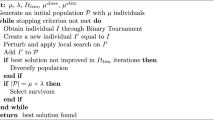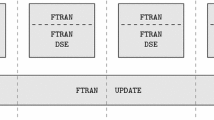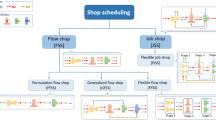Abstract
On-line scheduling problems are studied with jobs organized in a number of sequences called threads. Each job becomes available as soon as a scheduling decision is made on all preceding jobs in the same thread.
We consider two different on-line paradigms. The first one models a sort of batch process: a schedule is constructed, in an on-line way, which is to be executed later. The other one models a real-time planning situation: jobs are immediately executed at the moment they are assigned to a machine.
The classical objective functions of minimizing makespan and minimizing average completion time of the jobs are studied.
We establish a fairly complete set of results for these problems. One of the highlights is that List Scheduling is a best possible algorithm for the makespan problem under the real-time model if the number of machines does not exceed the number of threads by more than 1. Another one is a polynomial time best possible algorithm for minimizing the average completion time on a single machine under both on-line paradigms.
Similar content being viewed by others
REFERENCES
Albers, S., “Better bounds for on-line scheduling,” in Proc. 29th Annu. ACM Symp. on the Theory of Computing (STOC), 1997, pp. 130-139.
Alborzi, H., E. Torng, P. Uthaisombut, and S. Wagner, “The k-client Problem,” in Proc. 8th Annu. ACM-SIAM Symp. on Discrete Algorithms (SODA), 1997, pp. 73-82.
Bartal, Y., A. Fiat, H. Karloff, and R. Vohra, “New algorithms for an ancient scheduling problem,” J. Comput. Syst. Sci., 51, 359-366 (1995).
Borodin, A. and R. El-Yaniv, On-line Computation and Competitive Analysis, Cambridge University Press, Boston, 1998.
Feuerstein, E., On-line Paging of Structured Data and Multi-threaded Paging, Ph.D. Thesis, Università di Roma, “La Sapienza,” 1995.
Feuerstein, E. and A. S. de Loma, “On multi-threaded paging,” in Proc. 7th Annu. Int. Symp. on Algorithms and Computation (ISAAC'96), Lecture Notes in Computer Science 1178, Springer-Verlag, Berlin, 1996, pp. 417-426.
Feuerstein, E. and A. S. de Loma, Different Competitiveness Measures for Multi-threaded Paging, International Workshop on On-line Algorithms, OLA98, Udine, Italy, 1998.
Fleischer, R. and M. Wahl, “On-line scheduling revisited,” J. Sched., 3, 343-353 (2000).
Graham, R. L., “Bounds for certain multiprocessing anomalies,” Bell Syst. Tech. J., 45, 1563-1581 (1966).
Karger, D. R., S. J. Philips, and E. Torng, “A better algorithm for an ancient scheduling problem,” J. Algorithms, 20, 400-430 (1996).
Kimbrel, T., “Online and offline preemptive two-machine job shop scheduling,” IBM Research Report RC 21520, 1999.
Lawler, E. L., J. K. Lenstra, A. H. G. Rinnooy Kan, and D. B. Shmoys, “Sequencing and scheduling: algorithms and complexity,” in S. C. Graves, A. H. G. Rinnooy Kan and P. H. Zipkin (eds.), Handbooks in Operations Research, Vol. 4 North Holland, Amsterdam, 1993.
Sgall, J., “On-line scheduling,” in A. Fiat and G. Woeginger (eds.), On-line Algorithms—The State of the Art, Lecture Notes in Computer Science 1442, Springer-Verlag, Berlin, 1998, pp. 196-231.
Smith, W. E., “Various optimizers for single-stage production,” Naval Res. Logistics Q., 3, 59-66 (1956).
Author information
Authors and Affiliations
Rights and permissions
About this article
Cite this article
Feuerstein, E., Mydlarz, M. & Stougie, L. On-line Multi-threaded Scheduling. Journal of Scheduling 6, 167–181 (2003). https://doi.org/10.1023/A:1022987804726
Issue Date:
DOI: https://doi.org/10.1023/A:1022987804726




